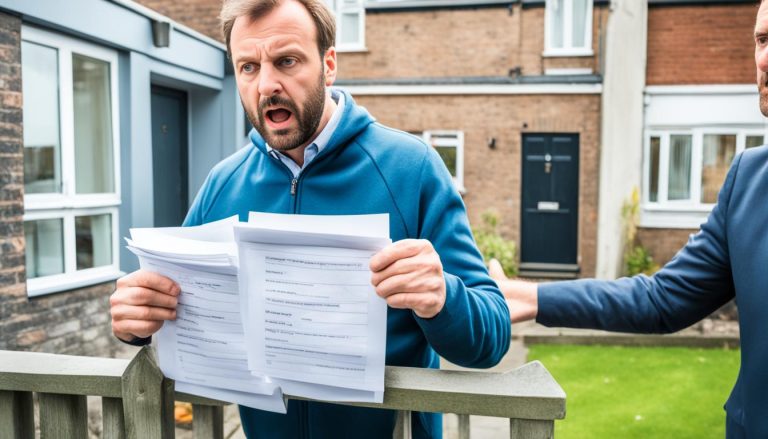As a landlord living outside the UK, earning rental income from UK properties comes with specific tax obligations. One crucial regulation you must comply with is the Non-Resident Landlord Scheme (NRLS).
This scheme, overseen by HMRC (Her Majesty’s Revenue and Customs), ensures that the correct amount of tax is collected from rental income earned by landlords who live abroad.
If you’re an overseas landlord, it’s essential to understand how this scheme works, its rules, and your responsibilities as either a landlord, letting agent, or tenant.
This guide provides a comprehensive breakdown of everything you need to know about the Non-Resident Landlord Scheme, including how to register, how tax is collected, and the consequences of non-compliance.
What is the Non-Resident Landlord Scheme?

The Non-Resident Landlord Scheme (NRLS) is a UK tax regulation that applies to landlords who live outside the UK but earn rental income from UK properties. The main goal of the scheme is to ensure that taxes on rental income are paid in a timely and efficient manner.
Under the scheme, tenants or letting agents are required to deduct basic-rate tax (currently 20%) from the landlord’s rent payments before they are transferred to the landlord. This deduction is then paid directly to HMRC.
However, landlords can apply to receive rental income in full (gross) without any tax being deducted. To do this, they must register for the scheme and demonstrate that they are meeting all their UK tax obligations.
Why Was the Scheme Introduced?
The scheme was introduced to ensure that landlords who live abroad pay tax on their UK rental income. Before the scheme, it was difficult for HMRC to monitor and collect taxes from overseas landlords. By making letting agents and tenants responsible for deducting tax at the source, HMRC ensures that taxes are collected before the rent reaches the landlord.
This process helps to reduce tax evasion, increase compliance, and protect the UK’s tax revenue from rental properties owned by overseas investors.
Who Qualifies as a Non-Resident Landlord?
A non-resident landlord is anyone who owns and rents out property in the UK but lives outside the UK for at least six months (183 days) in a tax year. The term applies to:
- Individual landlords (UK citizens living abroad or foreign nationals).
- Companies that own and rent out UK properties but are based outside the UK.
- Trustees of trusts with rental income from UK properties.
The key point is that even if you are a UK citizen, you will be classified as a non-resident landlord if you live outside the UK for at least six months of the year.
Key Responsibilities of Non-Resident Landlords
If you are a landlord living outside the UK and earning rental income from UK properties, you are required to comply with certain rules under the Non-Resident Landlord Scheme. These include:
1. Register with HMRC as a Non-Resident Landlord
The most crucial step is to register with HMRC under the scheme. Without registration, your letting agent or tenant is required to deduct 20% tax at source from your rent before it is paid to you.
How to Register:
- Submit the relevant form to HMRC:
- NRL1 for individual landlords.
- NRL2 for companies.
- NRL3 for trusts or estates.
- You must provide proof of identity and proof of residence outside the UK.
- Once approved, you can receive your rental payments gross (without tax deductions).
Why It Matters:
- If you fail to register, your tenants or letting agent must withhold tax at 20% from your rent payments.
- Registering for the scheme allows you to receive your rental payments in full, which improves your cash flow.
2. Ensure UK Tax Obligations Are Met
Even if you are registered under the NRLS, you must still meet your tax obligations in the UK. This means:
- Filing a Self-Assessment tax return each year to declare rental income and calculate tax liability.
- Paying any additional taxes due by 31 January following the end of the tax year.
- Keeping accurate financial records of your rental income and allowable expenses, as these may be required when completing your tax return.
3. Keep HMRC Informed of Changes
If your situation changes, you must inform HMRC. Key changes you must report include:
- Change of letting agent: If your letting agent changes, you must notify HMRC and ensure the new letting agent receives the approval notice from HMRC.
- Change of tenant: If a tenant becomes responsible for paying you directly (rather than through an agent), you must ensure they are aware of their responsibilities to deduct tax unless you are registered.
- Changes in ownership: If the ownership of the property changes, or if the landlord dies, a new application for non-deduction of tax must be submitted.
4. Apply for Approval to Receive Rent Gross (No Tax Deduction)
If you want to receive your rental payments in full, you must apply for approval from HMRC. Approval will be granted if:
- Your UK tax affairs are up to date.
- You have never had a UK tax obligation before.
- You do not expect to have a UK tax liability for the current tax year.
If approval is granted, your tenants and letting agents will be informed by HMRC and will no longer need to deduct tax from your rental payments.
Key Responsibilities of Letting Agents

If a non-resident landlord hires a letting agent to manage their UK property, the agent takes on significant responsibilities under the Non-Resident Landlord Scheme.
1. Deduct 20% Tax from Rent if Landlord is Not Approved
If the landlord is not registered with the NRLS, the letting agent must:
- Deduct 20% of the rental income before paying it to the landlord.
- Pay the deducted tax directly to HMRC.
- Record all payments and submit a quarterly return (form NRLQ) to HMRC detailing the amount of tax deducted.
2. Report Payments to HMRC
Letting agents must submit quarterly returns to HMRC, detailing:
- The gross rent paid to the landlord.
- The amount of tax deducted from the payments.
- Payments made to HMRC.
The deadlines for submitting the returns are:
- 31 March (for the period January – March)
- 30 June (for the period April – June)
- 30 September (for the period July – September)
- 31 December (for the period October – December)
3. Issue an Annual Certificate of Tax Deduction (NRLY)
At the end of the tax year, the letting agent must issue an NRLY certificate to the non-resident landlord. This certificate outlines the tax deducted throughout the year and can be used by the landlord to complete their Self-Assessment tax return.
4. Notify HMRC of Changes
If the letting agent is no longer responsible for managing a landlord’s property, they must notify HMRC and hand over any relevant tax-related information to the new agent.
Key Responsibilities of Tenants
If there is no letting agent managing the property, the responsibility for ensuring compliance with the Non-Resident Landlord Scheme shifts to the tenant.
1. Deduct 20% Tax if the Landlord is Not Approved
If the landlord is not registered with the NRLS, the tenant must:
- Deduct 20% tax from the rent they pay.
- Send the withheld amount directly to HMRC.
For example, if your monthly rent is £1,000, you would need to deduct £200 and pay it to HMRC. The landlord would only receive £800.
2. Submit Returns to HMRC
If you are a tenant paying rent directly to a non-resident landlord, you must:
- File a quarterly tax return with HMRC.
- Submit payment of the deducted tax along with the return.
The deadlines for returns are the same as those for letting agents (March 31, June 30, September 30, and December 31).
3. Issue an Annual Certificate of Tax Deduction (NRLY)
Just like letting agents, tenants must issue an NRLY certificate to the landlord at the end of the tax year. This certificate outlines the tax deducted from rent payments.
Penalties for Non-Compliance
Failure to comply with the rules of the Non-Resident Landlord Scheme can result in serious consequences for landlords, letting agents, and tenants.
| Party | Non-Compliance Issue | Penalty or Consequence |
| Landlord | Failure to register with HMRC | 20% of rent deducted at source by tenants/agents |
| Landlord | Not filing a tax return | Fines for late submission and interest on tax due |
| Letting Agent | Failure to deduct tax | Held liable for unpaid taxes + penalties |
| Letting Agent | Failure to submit quarterly returns | Fines and interest from HMRC |
| Tenant | Failure to deduct tax | HMRC will pursue the tenant for the unpaid taxes |
| Tenant | Failure to submit quarterly returns | Penalties for non-compliance |
H2: What Happens If the Non-Resident Landlord Dies?
If a non-resident landlord dies, the approval to receive rent without tax deduction no longer applies. Payments made to the landlord’s estate or successor will be subject to 20% tax deduction until HMRC confirms that the new payee is approved.
If the rental income is paid to:
- A UK-based executor: No tax is deducted.
- A non-resident executor or trustee: The executor must apply for approval to receive rent without tax deductions.
If the landlord’s spouse inherits the rental property, they must also apply for HMRC approval to avoid tax deductions.
How the Non-Resident Landlord Scheme Works in Practice?

- Before Rent is Paid: If the landlord is not registered with HMRC, the letting agent or tenant must withhold 20% of the gross rent.
- Tax Sent to HMRC: This amount is paid directly to HMRC.
- Net Payment to the Landlord: The landlord receives the remaining 80% of the rent after tax is deducted.
How Do Non-Resident Landlords Receive Rental Payments?
If the landlord has registered with HMRC and been approved to receive gross payments, they will receive the full rent with no tax deductions. Otherwise, 20% of the rent will be withheld by the tenant or letting agent.
When Can a Landlord Receive Gross Rental Payments?
Landlords can apply to receive gross rental payments (no tax deduction) if they:
- Have a clean tax compliance history.
- Are up-to-date with previous tax payments.
Tax Implications for Non-Resident Landlords
Do Non-Resident Landlords Need to File a UK Tax Return?
Yes, non-resident landlords must file a Self-Assessment tax return even if tax has already been deducted. The tax return allows HMRC to determine if the landlord owes more tax or is entitled to a refund.
Tax Reliefs and Deductions
Non-resident landlords can claim tax deductions to reduce the amount of taxable rental income, including:
- Letting agent fees.
- Repairs and maintenance costs.
- Mortgage interest (restrictions apply).
How to Apply for Approval to Receive Rental Income with No Tax Deducted?
Who Needs to Apply?
Landlords who live outside the UK but earn rental income from UK properties must apply for approval to receive rental payments without tax being deducted. This approval is granted by HMRC.
Typically, landlords must apply if:
- They live outside the UK for more than six months of the tax year.
- They want to receive their rent in full (gross) without any tax deductions.
Note: If you are a letting agent or tenant, you are required to deduct tax if the landlord does not have approval from HMRC.
Forms Required for Application
To apply for approval, landlords need to fill out one of the following forms, depending on their status:
| Form | Who Should Use It? |
| NRL1 | Individual landlords living outside the UK |
| NRL2 | Companies that own and rent out UK property |
| NRL3 | Trustees or executors of a trust renting out UK property |
All three forms are available on the HMRC website and come with step-by-step instructions for completion. These forms are essential for landlords seeking to receive their rental payments without the 20% tax deduction.
Step-by-Step Application Process
Step 1: Complete the Correct Form (NRL1, NRL2, or NRL3)
- Download the appropriate form from HMRC’s official website.
- Provide information about yourself (name, address, and tax reference number) and details about the UK property being rented.
- Indicate whether you meet the conditions to receive rent without deduction.
Step 2: Submit Proof of Residency Status
To prove you are a non-resident landlord, you may need to submit additional documents, such as:
- Passport or ID to confirm your identity.
- Proof of non-residency, such as bank statements, utility bills, or government-issued documents.
Step 3: Send the Application to HMRC
- Submit your form online or send it to the Public Departments 1 office of HMRC.
- If you are dealing with the Public Departments 1 office, check the address and phone number on the relevant form (NRL1, NRL2, or NRL3).
Step 4: Wait for HMRC Approval
- HMRC reviews the application and determines if you meet the conditions for gross payment approval.
- It typically takes up to 8 weeks for HMRC to approve or reject an application.
Conditions for Receiving Approval
HMRC will only grant approval for non-resident landlords to receive rent without tax deduction if one of the following conditions is met:
- The landlord’s UK tax affairs are up to date: No outstanding taxes or obligations are due.
- The landlord has never had UK tax obligations: This may apply to first-time landlords who are not familiar with the UK tax system.
- The landlord does not expect to be liable for UK tax for the relevant tax year: If you have no taxable UK income, you may be exempt.
If none of these conditions are met, HMRC may reject the application.
Special Circumstances for Sovereign Immunity

Landlords who qualify for sovereign immunity are exempt from UK taxation, meaning they don’t need to pay tax on their UK rental income. However, these landlords must still notify HMRC to receive their rent in full without deductions.
Who Qualifies for Sovereign Immunity?
- Foreign governments
- Diplomatic missions
- Certain international organizations
How to Apply for Sovereign Immunity
- You do not need to complete a standard NRL1, NRL2, or NRL3 form.
- Instead, you must write directly to HMRC and provide evidence of your sovereign immunity status.
- If possible, submit a copy of the sovereign immunity confirmation letter from HMRC.
When to Apply for Approval
If you plan to move abroad and become a non-resident landlord, the ideal time to apply is no more than 3 months before you leave the UK. This allows sufficient time for HMRC to review and process your application.
If you are already living outside the UK, you can submit your application at any time. There is no deadline for existing non-resident landlords to apply.
Withdrawal of Approval by HMRC
In some cases, HMRC may decide to withdraw approval for a non-resident landlord to receive rental payments without deductions. This typically occurs if:
- Incorrect information was provided on the application.
- The landlord is no longer meeting their UK tax obligations.
- The landlord fails to provide additional information requested by HMRC.
When HMRC withdraws approval, they will:
- Notify the landlord of the reason for withdrawal and the effective date.
- Inform the letting agent or tenant to resume withholding tax from rental payments from a specific date.
If the landlord disagrees with the decision, they can appeal the decision within 90 days. The appeal is reviewed by an independent tribunal.
Changes in Letting Agent or Tenant
If the letting agent or tenant changes, the new agent or tenant may not have a notice of HMRC’s approval. In this situation, tax must be deducted from rental payments unless the landlord:
- Notifies HMRC of the change.
- Ensures the new letting agent or tenant has received a copy of the approval notice.
If a Non-Resident Landlord Dies
When a non-resident landlord dies, the approval to receive rental payments without tax deductions is no longer valid. However, rental payments made to an executor, trustee, or spouse of the landlord may still be eligible for exemption.
What Happens Next?
- If rent payments are made to a UK-based executor, no tax is deducted.
- If rent payments are made to a non-resident executor, tax must be deducted unless the executor applies for approval using form NRL3.
- Spouses who continue to receive rental payments must also apply for HMRC approval to avoid tax deductions.
Irish Charities, Superannuation Schemes, and Insurance Companies
Certain Irish organizations are automatically exempt from UK tax under the Double Taxation Convention between the UK and Ireland. These organizations include:
- Charities
- Superannuation schemes (pension funds)
- Insurance companies (for their pension business)
Instead of filling out NRL1, NRL2, or NRL3 forms, these entities must submit a Form Ireland-Company to claim the exemption.
Common Challenges and Mistakes in the NRLS
- Late Registration and Missed Deadlines: Failing to register on time could result in 20% tax deductions from rental payments and fines from HMRC.
- Misunderstanding Tax Deduction Rules: Landlords often assume the tenant or letting agent automatically handles everything. This mistake could result in non-compliance.
- Failing to File a Tax Return: Landlords often think that once tax is deducted, they have no further obligations. This is incorrect. Filing a Self-Assessment tax return is still required.
Benefits of the Non-Resident Landlord Scheme

Why Should Landlords Register for the Scheme?
- Receive full rent payments without tax deductions.
- Simplify administration for tenants and agents.
- Maintain a clean tax record with HMRC.
Conclusion
The Non-Resident Landlord Scheme ensures that landlords who live abroad pay taxes on their UK rental income. Registering for the scheme is crucial if you want to receive gross rental payments without tax deductions.
By understanding your obligations and following the proper steps, you can avoid penalties and ensure smooth, uninterrupted rental payments.
FAQs About Non-Resident Landlord Scheme
Do I need to register for the Non-Resident Landlord Scheme if I live abroad?
Yes, if you live outside the UK for over 6 months in a year and earn rental income from UK properties.
How do I avoid having my rent payments taxed?
You must register for the scheme and prove to HMRC that you are tax-compliant.
Do I still need to file a UK tax return if I’m part of the NRLS?
Yes, all landlords earning UK rental income must file a Self-Assessment tax return.
How do I apply for the Non-Resident Landlord Scheme?
Complete the NRL1 form on the HMRC website and provide proof of your non-residency status.





